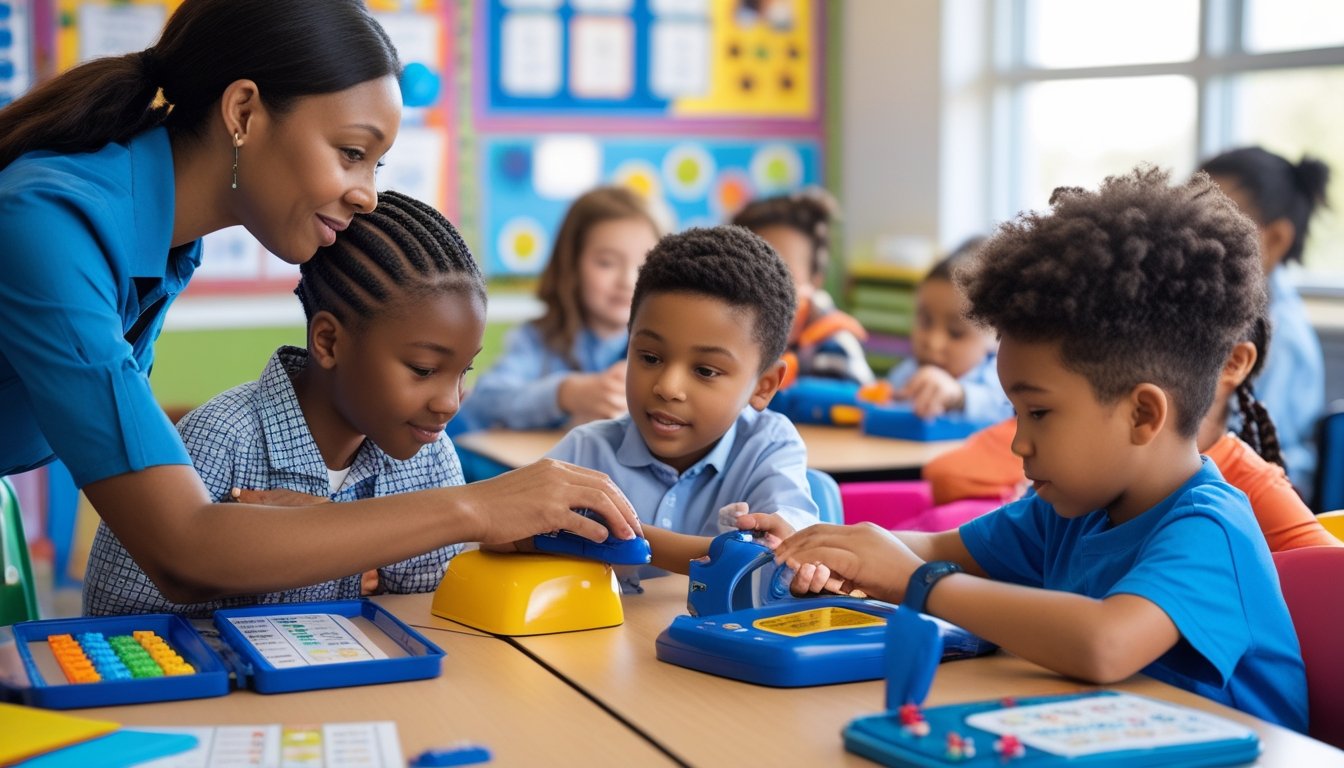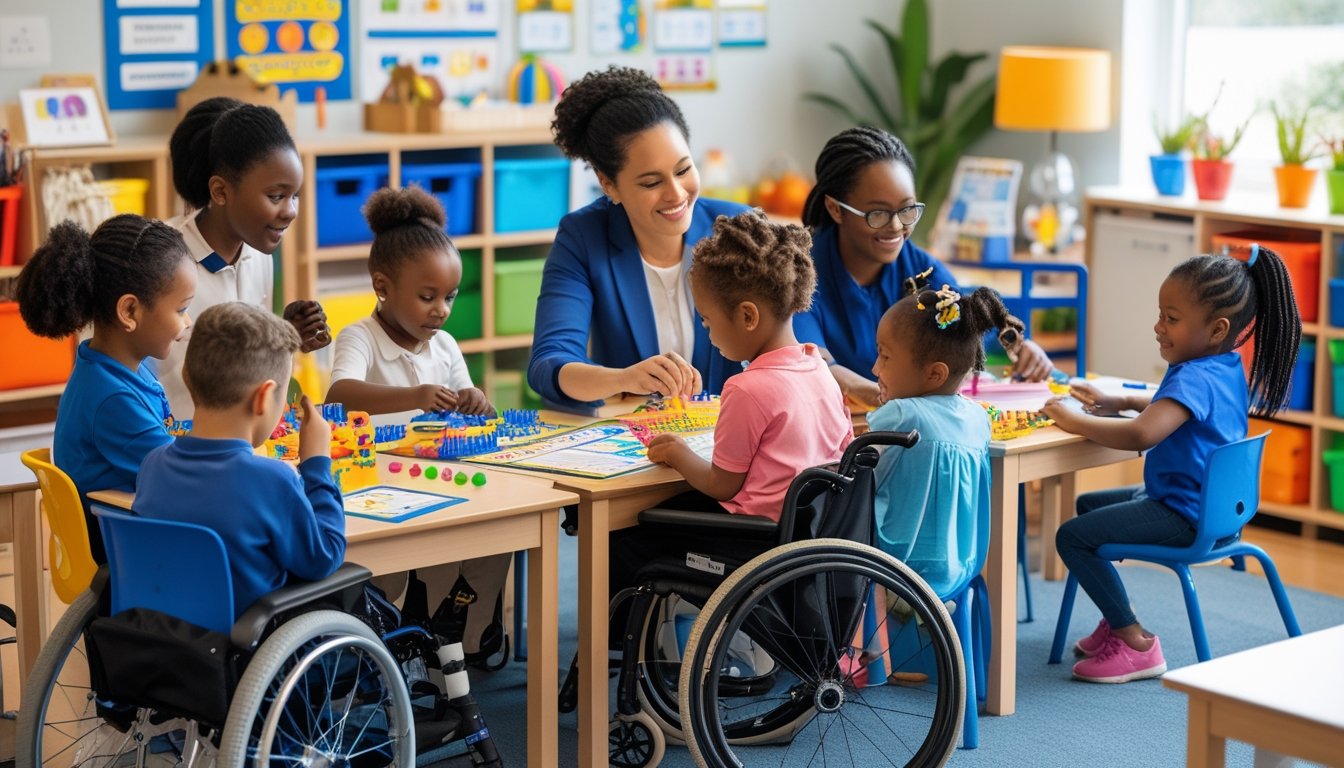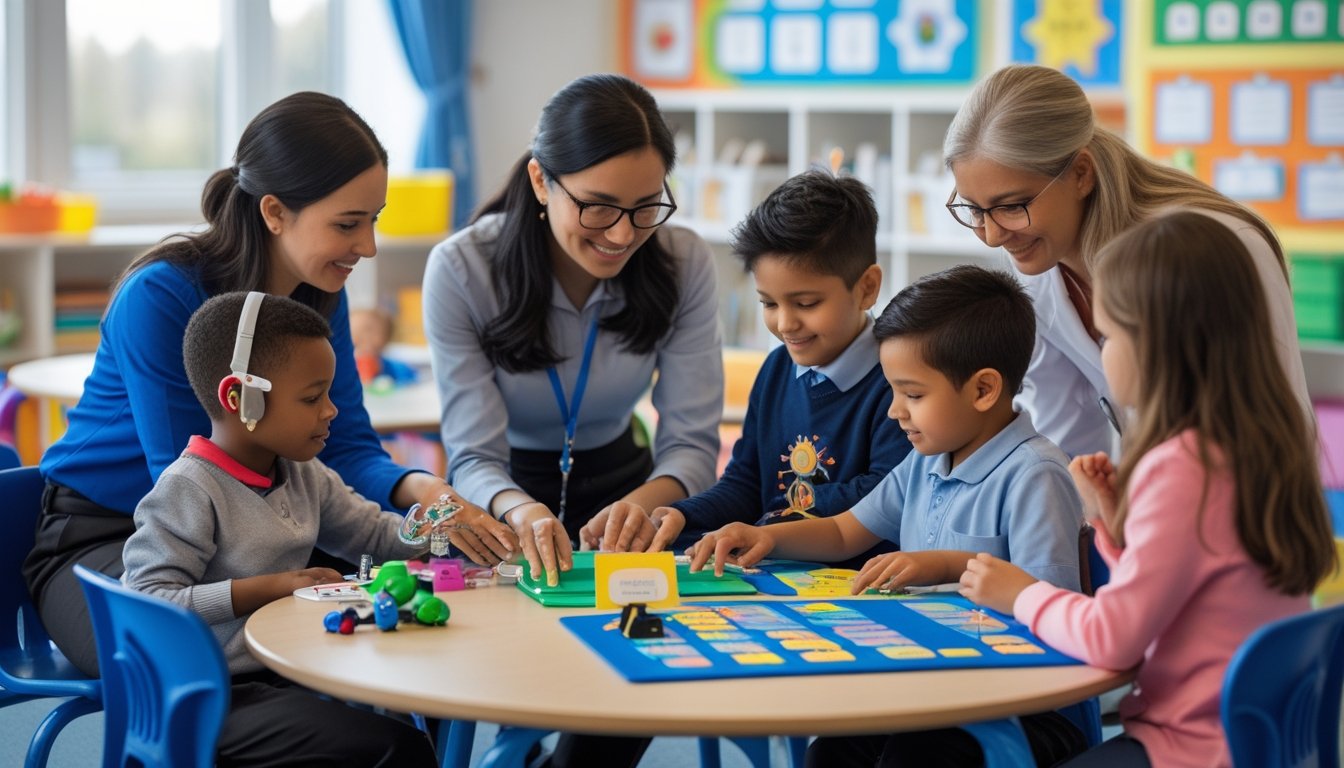Late updated: 18 Jun 2025 14:06
Written by:
Supporting Children With Special Educational Needs: Effective Strategies and Approaches
Supporting children with special educational needs is essential in ensuring they receive equal opportunities to thrive both academically and socially. Navigating this journey requires understanding their unique requirements and implementing effective strategies tailored to their specific needs. By creating an inclusive environment, we empower these children to succeed to their fullest potential.

Our role as educators and caregivers extends beyond just implementing educational plans. It involves fostering a positive, supportive atmosphere that encourages independence and growth. From Individualised Education Programmes (IEPs) to adaptive teaching techniques, there are numerous tools at our disposal to help children engage and flourish.
Engagement with children with special needs comes from employing a collaborative approach, involving parents, teachers, and specialists in a coordinated effort. This ensures that every child receives the appropriate resources tailored to their individual needs, ultimately leading to a more inclusive and productive learning environment.
Key Takeaways
- Understand and cater to the unique needs of children with special educational needs.
- Foster a supportive, inclusive environment where children can thrive.
- Collaboration between parents, educators, and specialists is key to effective support.
Understanding Special Educational Needs And Key Support Structures

In fostering a supportive educational environment, we must first comprehend the scope of special educational needs and the frameworks in place to address these challenges. By recognising different disabilities and understanding significant legislation, we can better accommodate and enhance learning for every child.
Defining Special Educational Needs
Special Educational Needs (SEN) encompasses a multitude of challenges that affect a child’s ability to learn. It includes difficulties with communication, cognition, emotional and behavioural development. Children with SEN might require different educational approaches to succeed.
Understanding these needs helps us provide effective support. Some children may face transient challenges, while others need longer-term interventions. Recognising the spectrum of needs guides us in implementing tailored educational strategies.
Common Types Of Disabilities And Developmental Delays
Many disabilities can fall under SEN, each presenting unique challenges. These include developmental delays, such as autism spectrum disorders and intellectual disabilities. Conditions like ADHD (Attention-Deficit/Hyperactivity Disorder) also impact learning.
Every child’s experience with their disability is unique. For instance, children with autism may face social interaction difficulties, while those with ADHD might struggle with attention and impulse control. Our role is to ensure that adaptive strategies and instructional support are in place, enabling these children to thrive in an inclusive setting.
Legislation: The Importance Of The Individuals With Disabilities Education Act (IDEA) And The 504 Plan
Legislation plays a pivotal role in ensuring educational equity. The Individuals with Disabilities Education Act (IDEA) mandates that children with disabilities are entitled to Free Appropriate Public Education (FAPE). This creates tailored educational paths through Individualised Education Programs (IEP).
The 504 Plan, under the Rehabilitation Act, offers additional accommodations for students who may not qualify for an IEP. These plans are crucial for providing modifications to assist in daily activities, ensuring equal access to education for all students. These frameworks safeguard the rights of children with SEN and outline clear paths for educational support and success.
Effective Approaches For Supporting Children With Special Educational Needs

Supporting children with special educational needs requires tailored strategies that include early identification, personalised education plans, and the utilisation of technology. These approaches ensure that each child's unique requirements are met, fostering an inclusive environment conducive to learning. Let's break these down into key areas.
Assessment And Early Identification
Early identification and assessment are crucial elements in supporting children with special educational needs. Identifying learning challenges at an initial stage allows us to provide targeted interventions and support. Early assessments often involve collaborative efforts between educators, parents, and specialists. These assessments can identify specific needs such as dyslexia or other learning disabilities. Early intervention helps mitigate potential barriers to learning and lays a solid foundation for future educational success.
Regular monitoring and updated assessments ensure that the educational strategies remain effective and responsive to the child's evolving needs. With the implementation of structured assessment methods, educators can develop a clear understanding of each child's abilities and challenges. This proactive approach prevents difficulties from becoming deep-rooted, allowing for a more seamless educational journey.
Individualised Education Programmes (IEP) And Modifications
Creating an Individualised Education Programme (IEP) is a key strategy for students requiring specialised support. Each IEP is unique and involves setting specific goals tailored to the student's needs and capabilities. Modifications within these programmes may include adjusted curricula or alternative teaching methods that better suit the child's learning style.
Constant evaluation and adaptation of the IEP are necessary to ensure it meets current educational standards while addressing the student's development. By involving parents, teachers, and specialists in the IEP process, we can align the programme with both academic goals and personal growth objectives. The flexibility of an IEP allows for adjustments, ensuring a child’s educational path is as supportive and effective as possible.
School Support And Inclusive Classroom Accommodations
School support plays a critical role in the education of children with special needs. Inclusive classroom accommodations might involve modifications like preferential seating, extended time for testing, or the use of visual aids. Schools must foster an environment where diverse learning needs are recognised and met with appropriate resources and support.
Effective communication between educators and special education services is essential in implementing these accommodations. Teachers can collaborate with special education professionals to develop strategies that promote an inclusive learning environment. By addressing individual needs within a mainstream classroom, we can ensure every student has equal access to educational opportunities, promoting a sense of belonging and engagement.
Role Of Technology In Special Education
The integration of technology in special education has opened new avenues for learning and interaction. Assistive technologies, such as speech-to-text software or interactive learning apps, cater specifically to various disabilities, making learning more accessible and engaging. Technology provides endless possibilities for customisation and personalisation.
Incorporating technology into the educational process allows for diverse teaching methods suited to different learning styles. This can range from using digital whiteboards to facilitate visual learning to employing apps designed for skill development. The use of technology empowers students by offering tools that enhance their learning experiences, thereby fostering confidence and independence in their education journey.
Frequently Asked Questions

In order to effectively support children with special educational needs, it's important to understand the resources available, eligibility criteria for services, and effective strategies for teaching. Additionally, navigating the challenges faced by parents and finding suitable childcare facilities are crucial aspects to consider.
What resources are available to assist parents of children with special educational needs?
Parents can access a range of resources, from informational websites to support groups. Local education authorities often offer guidance, and organisations such as SPEDTex provide personalised advice. Additionally, many schools have dedicated staff members who can provide assistance and answer questions.
How can I determine if my child is eligible for special education services?
Eligibility for special education services typically involves a formal evaluation process. Parents should reach out to their child's school or the local education authority to initiate an assessment. The evaluation will identify the child's specific needs and determine their eligibility for support services.
What are some effective teaching strategies for students with special educational needs?
Personalised learning plans, such as Individual Education Plans (IEPs), are highly effective. Teachers can use differentiated instruction, adapting lesson plans to accommodate various learning styles. Utilising visual aids and hands-on activities can also enhance learning for students with special educational needs.
How can early years settings support children with additional needs?
Early years settings can implement inclusive practices to support children with additional needs. Staff should undergo specialised training to understand diverse needs. Creating a supportive and flexible learning environment, along with maintaining open communication with parents, is key to fostering an inclusive atmosphere.
What challenges do parents of children with special needs commonly face?
Parents may encounter difficulties such as navigating complex education systems or obtaining appropriate support. There can be emotional and financial challenges, and finding the right resources and information can feel overwhelming. Accessing support groups and professional guidance can often help alleviate these issues.
How can I find specialised childcare facilities for my child with special educational needs?
Researching local listings and consulting with education authorities are good starting points. Many specialised facilities offer tailored programmes designed for children with specific needs. Networking with other parents and seeking recommendations from professionals can also lead to finding appropriate childcare options.
